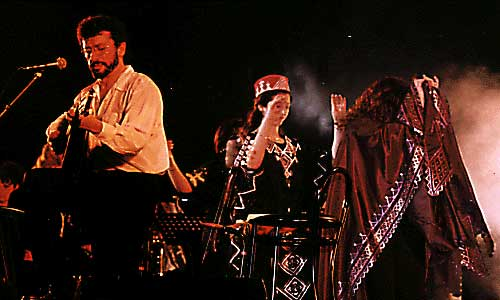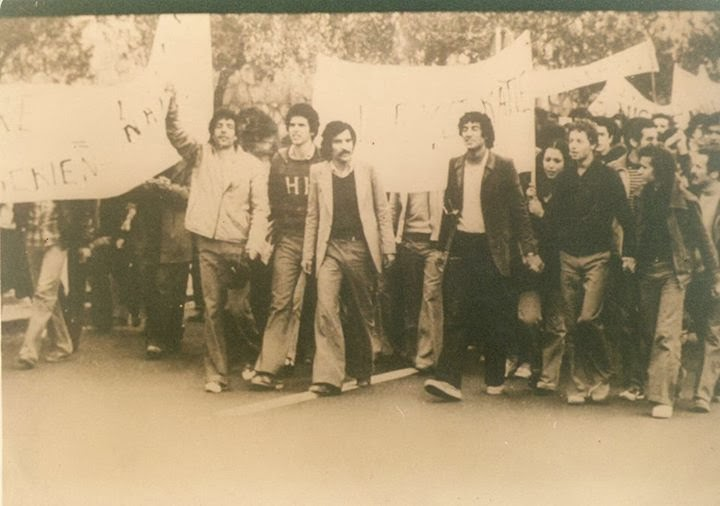The artist Matoub Alounas... Guevara the Amazigh and the parallel history writer of Algeria

He did not live long, but he greatly influenced the contemporary history of Algeria. He is the late Amazigh artist and activist, Matoub Lounes, the most symbolic figure in the Amazigh movement in Algeria. "He settled comfortably in the list of legendary leaders of the Amazigh people, such as El-Kahina, Axel, Jugurtha, and Massinsa," as described by an Algerian writer.
Alounas raised a lot of controversy during his life and after his death. With his songs, he tried to rewrite a parallel history of the Algerian revolution in the face of official history, and defended, through art, the cultural and political demands of the Amazigh people in the "Kabylian region", and he succeeded where political movements and parties failed.

The revolution turns against the Amazighs
At the end of the forties of the last century, the Algerian Amazigh movement began to crystallize its ideas and orientations. This happened when a group of cadres and members of the People's Party, led by Messali Hajj, decided to defect from the party because of its "non-recognition of the Amazigh identity of the Algerian people."
In 1954, the armed revolution broke out against the French colonialists. The Amazighs participated in the revolution within the Algerian National Liberation Front, and a number of them held high positions in the front politically, militarily, and in the media. In this revolutionary climate marked by national unity, Matoub Lounes was born on January 24, 1956.

The Algerian revolution succeeded and the colonizers left in 1962. At that time, the comrades-in-arms devoted themselves to their internal struggle in order to resolve the fate of the new power. The new regime, led by Ahmed Ben Bella (1916-2012), raised the slogan of “the Arabism of the country,” influenced by the Arab mood at that stage and because of his relations with Gamal Abdel Nasser, who supported the Algerian revolution politically and militarily. Even Ibn Bella said at that time in a famous sermon: "We are Arabs, we are Arabs, we are Arabs." The regime's pan-Arabist discourse was accompanied by a series of forced Arabization measures for the Kabylie region. The use of the Amazigh language in artistic and literary activities was banned, and anyone suspected of belonging to movements raising Amazigh cultural and linguistic demands was tried and imprisoned.
Meanwhile, the boy's damaged consciousness was beginning to be shaped by what he saw and heard from the adults. He wrote in his autobiography, entitled "The Rebel" : "We believed that the atrocities of the war ended with independence, which was denied by the events. After only a year, violence broke out in our region. The officers of the third term rose up against Ibn Bila, and the confrontations intensified, and our villages were subjected to more abuse than they witnessed at the hands of The colonizer killed 100 people.

The new authority got rid of all the leaders of the Algerian revolution of Amazigh origins, and one of its leaders, the Amazigh Hussein Ait Ahmed, was sentenced to death in 1964, only to escape from prison and live in exile. Prominent leader Karim Belkacem, one of the founders of the National Liberation Front, was tried in absentia, only to end up killed by French intelligence in his exile in 1970. The authorities did not publicly link these trials and executions to the leaders’ ethnic origins, but the Amazighs felt systematic targeting from the regime, fueled by an official “Arabist” ideology. This is confirmed by the forced Arabization measures that were strengthened after President Houari Boumediene came to power in a military coup in 1965.
Singing identity and culture
Influenced by Kabyle folk songs and his mother's melodious voice, Matoub El Ounas began singing at Amazigh weddings and folk parties. He wrote and composed his own songs. The return of his immigrant father in France to the homeland, carrying a guitar, was the most beautiful gift he received in his life, as appears from his biography.
Alounas's songs centered around the Amazigh identity and culture in the face of policies to obliterate this identity. He was singing about Karim Belkacem and Commander Amirouche, one of the military leaders of the Algerian revolution, and Commander Aban Ramadan, who was assassinated by comrades-in-arms, i.e. names that were taboos that were forbidden to be approached at that time, as the Algerian state was busy writing an official history of the revolution that suits its political orientations.
Alounas carried a project opposite to the project of power with technical tools. He tried to write a parallel history of the revolution and documented it with the songs that were spreading in villages and towns and understood by adults and children, the intellectuals and the illiterate. Amazigh for him was more than a communication tool. "Tamazight is my mother tongue, and whenever I speak it I imagine myself as if I am resisting," he said. Thus, Alounas became the voice of the Amazigh people.
Amazigh spring and beyond
In March 1980, the Algerian security forces prevented a cultural symposium in which the Amazigh writer Mouloud Mamari was to lecture on "Poetry in the Kabyle region in ancient times." This was the straw that broke the camel's back, igniting the direct popular confrontation between the angry Amazigh youth and the authorities. On April 20, the streets of Kabyle cities and its capital, Tizi-Ouzou, were filled with the largest popular demonstration since Algeria's independence.

Before that, Alounas had left for France and had an artistic experience in which he achieved fame among the Algerian community there. His emigration was preceded by a period of compulsory conscription, which deepened the gap between him and the regime, as he describes it by saying: "I realized, through the two years of conscription, that the army has no goal other than developing feelings of fear among the youth regarding the regime and power."
From Paris, Alounas followed the events of the long-awaited spring. "I was nervous about not participating in the events," he said. "I was torn between my wild desire to be among the people of my region and my artistic commitment. I sang in front of the audience and made sure to wear a military uniform to say that we are fighting a battle." His way to support the uprising was his song Yahzen El Oued Aïssi, which became famous and immortalized the memory of the victims.
The Amazigh Spring brought about its end, and with it the demands of the Amazigh movement crystallized in recognizing the Amazigh language as one of the official languages, constitutionalizing it, and lifting the economic marginalization of the Kabyle region. The authority responded by accusing her of being agents of treason and bullying a foreigner.
In 1988, these demands were renewed during the uprising that spread throughout Algeria against the one-party system and in protest against the deteriorating economic situation. Alounas was present this time and was injured in a failed assassination attempt, turning into a Amazigh legend that inflames theaters whenever he climbs on it.
After the rise of Islamic groups in Algeria and the country's entry into the stage of military confrontation during the "bloody decade", Alounas began to fight on two fronts: the regime and the Islamists, demonstrating his secular and progressive tendencies. His songs during this period were characterized by sadness and documentation of the country's struggle, the most important of which is his song in the obituary of President Mohamed Boudiaf.

Death is the path to immortality
The conflict escalated in Algeria, and with it the criticism of Al-Wanas escalated, and his opinion was heard and influential among the tribes. Therefore, the man's head has become wanted, and Islamic groups have put him on their blacklist. In September 1994, he was kidnapped by a cell belonging to the Armed Islamic Group. The angry Amazigh youth went out looking for Matoub in the Kabylie forests and threatened an all-out war against the jihadist elements holed up in the mountains.
And on the night of October 10, the cell released Alwanas under popular pressure, to declare upon his release: “If it was necessary for me to kill in order to protect the values I believe in and for my family to cling to them, I will not wait for them to slaughter me. Rivers of honey and milk. I want to defend myself. Resistance is a legitimate defense that requires means. They were unable to break my thorn during 15 days of detention, and now I will assure them, rather we will assure them that we are stronger than them. No one can stand in our way. Our battle is just and noble. I swear by that."
Alounas, in response to his accusation of separatism, had translated the Algerian national anthem into the Amazigh language, preserving the same melody. The funny thing is that the words of this anthem were written in Arabic by the Amazigh poet Mufdi Zakaria.
On June 25, 1998, 78 bullets lodged in the body of Matoub Lounes on the outskirts of his city, Tizi Ouzou. He passed away after escaping death dozens of times. The Algerian authorities accused the Armed Islamic Group of being behind the incident, and the latter claimed the operation in a statement. But his family doubted the official version.
Alounas turned into an Amazigh icon. The Amazigh writer, Nait Abd al-Razzaq, told that after his death, Alounas became "a tribal guevara and settled comfortably in the list of legendary leaders of the Amazigh people throughout history, such as the priestess, Axel, Jugurtha, and Massinsa. His shrine has turned into a shrine, with whom they deal and seek blessings as they deal with the tombs of the righteous saints."
Source : websites

